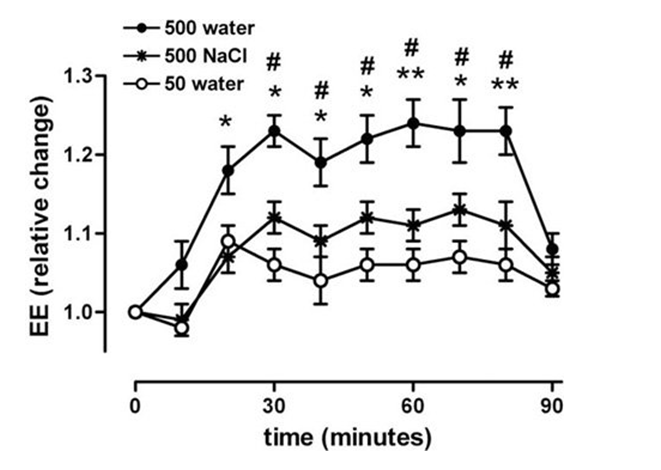You’ve heard about the 8×8 rule, eight 8 ounce glasses of water, which equals 2 liters (1/2 gallon). That’s a good amount for most of us, as an insurance policy, but there are things to factor in regarding optimal hydration-hot weather, exercise, breast feeding, vomiting, diarrhea, and sweating, obviously all increase our fluid requirements. Thirst is a good indicator, but often by the time you are aware of it, you may already be a bit dehydrated. According to Dr. Mercola, two thirds of us are walking around dehydrated and need to drink more.
Look at your urine: It should be a light yellow color (don’t confuse it with the bright yellow from vitamin B2 that may be in your multi). A healthy person will urinate about 7-8x/day. If you haven’t urinated in several hours, that is another indicator of dehydration.
Some of the less obvious symptoms of thirst:
HUNGER, even if you’ve recently eaten
Fatigue, mood swings
Joint pain
Dry skin, deeper wrinkles
Infrequent, dark urine
Constipation
Some additional perks of being optimally hydrated:
Weight loss:
In the Journal of Clinical Endocrinology Metab: Drinking 500 ml (17 oz.) of water increased metabolic rate by 24% over the next hour. The increase occurred within 10 min and reached a maximum after 30-40 min and stayed elevated over the entire hour. In men, lipids (fats) mainly fueled the increase in metabolic rate. In contrast, in women carbohydrates were mainly used as the energy source. Therefore, the thermogenic effect of water should be considered when estimating energy expenditure, particularly during weight loss programs. The researchers estimated that drinking 2 liters (68 oz) in one day can increase calorie burning by about 100 calories/day.
The top line below shows how 500 ml of water increased metabolism (EE – Energy Expenditure). You can see how the effect diminishes before the 90 minute mark (9):

It may be best to drink cold water for this purpose, because then the body will need to expend energy (calories) to heat the water to body temperature.
An additional study in children demonstrated an increase of up to 25% in resting energy expenditure following the drinking of cold water in overweight children, lasting for over 40 min.
A study published in the Journal of the American Dietetic Assoc. found that when overweight and obese adults were given 17 oz. of water 30 minutes before breakfast, they consumed significantly fewer calories-13% less at that meal! Drinking water about a 30 min before eating can also reduce the amount of calories people end up consuming, and this is true for overweight and normal weight individuals.
One study showed that over a 12 week period dieters who drank 500 ml of water before each meal lost 44% more weight compared to those who didn’t preload with water prior to eating.
How about tap water? Most of us in NJ steer clear, but that is not unwarranted. Even bathing in unfiltered water can lead to absorption of toxins that enter through open pores and through respiration. Scientists have found many contaminants in 1/3 of the water samples collected across the US.
Plastic water bottles: Even if you are careful about storage temperature, they are often sitting on a hot truck for many hours, leaching their toxic plastic chemicals into your drinking water.
One independent test performed by the Environmental Working Group (EWG) in 2011 revealed 38 low-level contaminants in bottled water. Each of the 10 tested brands contained an average of eight chemicals. Disinfection byproducts (DBPs), caffeine, Tylenol, nitrate, industrial chemicals, arsenic, and bacteria were all detected. Flouride is often present in both tap water and filtered bottled water.
What’s the answer: A water filter in your home. Use glass or stainless bottles instead.
If you want flavor, add some lemon or other fruit. Cucumber, crushed mint leaves (potent cancer fighters) are other nice additions.
Lastly, yes, other fluids count towards the total, even a little (organic) coffee. Many foods, including fruits and veggies contain significant amounts.
Bottom Line: Drink 17 oz of water before each meal, and continue to drink throughout the day to avoid thirst, more with activities that induce sweating. Flavor with fruit, cucumber, mint leaves. Use only filtered water that is kept in glass or stainless steel.

Comments are closed.